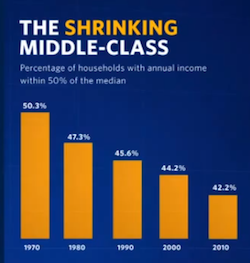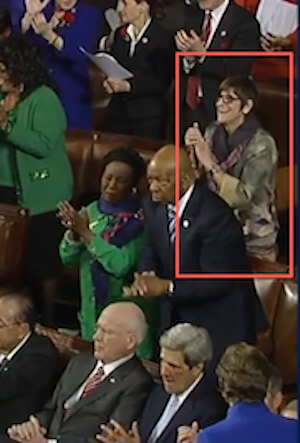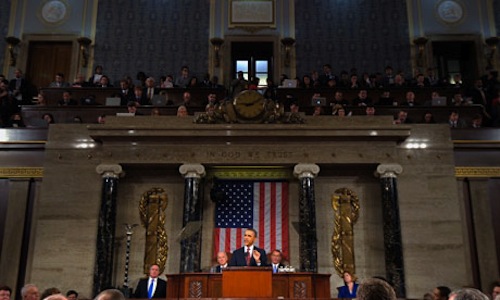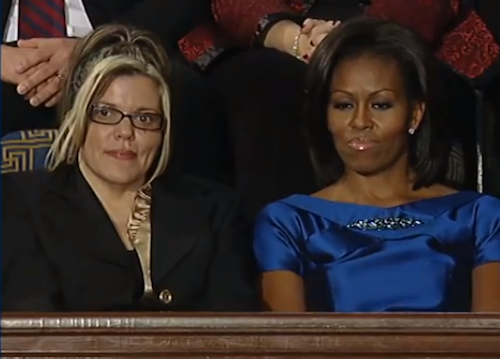Every year I watch the State of the Union Address, and every year I expect something amazing to happen: the President announces that he has nationalized Canada’s oil industry, for example, or says that he has a new position on gun control and then tears off his shirt to flex his biceps. The President turns to John Boehner, smiles, and calmly pushes his speaker gavel off the edge of the desk. Shockingly, none of that happened last night. It sort of looked like Joe Biden had a cold, and someone in the audience began either booing or shouting “Bruce!” at the proposal to ban insider trading by members of Congress. Also the President declared class war, but more on that later. First we have amusing screen caps.
I do not have a television, because I am a hyperintellectual bohemian and with all the cat videos I watch on the internet, I frankly don’t have time. I therefore watched SOTU in its Enhanced Version via the White House internet stream, which comes with lots of helpful graphs. At right, for example, is a startling representation of the shrinking of our middle class. As you can see, the portion of American households earning incomes within 50% of the national median has dropped from 50.3%, in 1970, to 42.2%—a loss of eight points or, as the graph indicates, almost two thirds. Those are some misleadingly proportioned bars, right there. If the American middle class loses another 16% of its households, it will disappear completely, which I think we can all agree is a crisis.
because I am a hyperintellectual bohemian and with all the cat videos I watch on the internet, I frankly don’t have time. I therefore watched SOTU in its Enhanced Version via the White House internet stream, which comes with lots of helpful graphs. At right, for example, is a startling representation of the shrinking of our middle class. As you can see, the portion of American households earning incomes within 50% of the national median has dropped from 50.3%, in 1970, to 42.2%—a loss of eight points or, as the graph indicates, almost two thirds. Those are some misleadingly proportioned bars, right there. If the American middle class loses another 16% of its households, it will disappear completely, which I think we can all agree is a crisis.
But we are Americans—we don’t want statistical evidence that our society has become so unequal that even Euclidean geometry is unfair. We want anecdotal evidence. One of the recurring features of modern SOTUs is the appearance of some Ordinary Person who represents what the President hopes to achieve. This year it was Jackie Bray, a woman who lost her job and went to community college to train for new work at Siemens. My favorite part of the Ordinary Person convention is when the camera focuses intently on her and she has to pretend not to care, even as she also pretends not to care that the President is talking about her at the exact same moment. Compare these two been-there faces:
Which of these people has already heard the President of the United States say she’s great? Michelle Obama has been a really satisfying spectatorial model at the last few SOTUs, since she invariably looks like she might leap up and start whipping people with a car antenna at any moment. The First Lady is not good at hiding her emotions. In this way she provides a refreshing counterpoint to, say, Barbara Bush, who always looked like she was about to smirk quietly as legislators began keeling over, one by one. If I have learned one thing from years of SOTUs, it is that the President’s wife thinks Congress is bitches.
They’re not all bad, of course. The numerous reaction shots—most of which involve standing ovations—that accompany any SOTU are a great time to identify your personal favorite lawmakers and/or recoil in horror at Henry Waxman. And sure enough, standing and cheering and briefly pumping her arms at the prospect of education funding, there’s Rosa DeLauro. She looks like she came to SOTU directly from a look-alike contest with your fun aunt. Or like she went on vacation with your elementary school art teacher and they fought the whole time, but whatever.
The numerous reaction shots—most of which involve standing ovations—that accompany any SOTU are a great time to identify your personal favorite lawmakers and/or recoil in horror at Henry Waxman. And sure enough, standing and cheering and briefly pumping her arms at the prospect of education funding, there’s Rosa DeLauro. She looks like she came to SOTU directly from a look-alike contest with your fun aunt. Or like she went on vacation with your elementary school art teacher and they fought the whole time, but whatever.
The important thing is that everyone was there: the inspiring couragers, the very uncomfortable military commanders, Charlie Rangel sitting next to Peter King for some reason, everybody. That took care of the first forty minutes. In the last twenty—the third act, if you will— the President drove home the real themes of his speech: that Congress works poorly and no one in America likes it, and also that maybe the dream of universal opportunity that has defined our nation since its founding is, like, dunzo.
The first point is, to recycle an analogy received poorly the first time, like scolding a cat. Members of Congress do not care about looking bad during the State of the Union Address, which probably tells us something about the state of our Union. More important is Obama’s proposal of the Buffett Rule, so named in his speech and in the infographic alongside, that would require Americans who make more than $1 million a year to pay a minimum 30% tax rate, no matter what.
Call it the Romney Rule if you want to be cynical. I submit that the Buffett Rule is the canary in the mine of SOTU 2012, the promise whose truth or falsehood will tell us whether the President means this stuff or not. If he can make Congress pass a millionaire’s tax—a tax that will affect 2% of American households and create an estimated eleventy gajillion dollars in federal revenue—I will officially declare Not Plutocracy Yet. Maybe an election year is the time to do it. Or maybe everyone will just stand up and applaud and then, after the chamber has been swept out, go back to using it for nothing.





